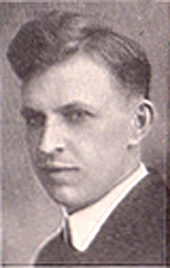
Raymond R. Brewer graduated from Dickinson College in 1916. He then went to Drew Theological Seminary, although his stay there was interrupted by his service in the First World War as a chaplain. After the war, Brewer returned to Drew and graduated in 1921 with a Bachelor of Divinity. After graduating from Drew, Brewer found employment at Boston University and stayed in contact with President Morgan and Dean Filler. When the Methodist Church Board of Foreign Missions contacted Morgan and Filler for suggestions as to who might be interested in becoming a missionary, Filler responded and suggested Brewer. Although the details of how and why Brewer became a missionary are not entirely clear, it is evident from his correspondence before and after working in China, that he was concerned and interested in all things international.
Brewer was selected to replace John Yost as Dickinson's representative at West China Union University (WCUU) in the Sichuan province of China. Dickinson College and the college YMCA used funds they collected to support his travels to China as the newest missionary representative of the College. Brewer sailed for Shanghai on September 15, 1921.
Brewer's acceptance of the post at the university marked a significant shift in the missionary movement in China. Unlike Francis Gamewell, whose presence in China was paired with an air of superiority, however slight, Brewer seems to have looked upon his task as educating the Chinese about Christianity more so than converting them; "Education is power in China" is the statement that guided his actions over the years.
Brewer's work not only affected the students in China, but also the American students at Dickinson College. Throughout Brewer's missionary tenure, Dickinson College students' participation in the annual China Fund Drive increased in the number of students participating and the total amount given by all students. Through his many letters to the Dickinsonian and faculty members on campus, Brewer has left an interesting history of his impressions of China and the West's relation to that nation. These letters to the Dickinsonian are key to understanding Brewer's role, and are important because they not only enlightened American colleagues and students but also inspired them to contribute to Brewer, Dickinson, and the Methodists' cause.
Brewer's work as an educator and missionary came at a difficult time in China's history. Warlords battled and controlled various provinces. Luckily, the general who controlled the Sichuan province where the WCUU was located, Yang Sen, was a relatively progressive and liberal warlord. This general frequently attended WCUU's educational events, and actively supported education in China with help from the West. Still, Brewer recounts how WCUU was frequently surrounded by gunfire as warlords continued fighting, or later as the Nationalists and Communists began fighting. Brewer recounts often being forced to hold classes in underground rooms so as to avoid potential stray bullets.
In such an environment, Brewer's analysis and views on China's political situation are invaluable. He sent a series of essays to the Dickinsonian to publish his views on China's current situation, past history and circumstances, as well as future potential. Brewer believed that China had great potential, but also great problems and obstacles to overcome. Corruption, blind nationalism, and ignorant zenophobia were among those problems. He often covered the growing anti-christian and anti-foreign movements that sought a scapegoat for China's collapse and chaos.
May, 1925 would prove to be an inauspicious time for the foreign presence
in China. In a series of letters to the Dickinson College Extension Board,
Brewer explains the facts and his opinions on what came to be called the Shanghai
Incident. On May 30, 1925, seventy student demonstrators were killed by British
police in Shanghai. After this event, the Chinese distrust of foreigners,
especially the British, reached new proportions. The fact that foreign investors
made up a significant portion of the industry in Shanghai did not help matters
much. The working conditions in the foreign-run factories were poor at best,
dangerous or deadly at worst, and the growth of Soviet propaganda in the area,
while not enough to account for the state of unrest and aroused suspicions,
was, according to Brewer, one of the contributing factors. Brewer suggested
two things in response to this unhappy turn of events: one, that the nations
with interests in China reevaluate their treaties out of respect for China
and two, that Dickinson establish a weekly or biweekly forum on China so as
to better inform students and to get their input.
Unfortunately, change did not occur quickly in China, and no one had expected it would. As anti-foreign tension increased, foreigners were told to leave the country for their own safety. The November 11, 1926 issue of the Dickinsonian reported that the West China Union University had been temporarily closed by the Chinese government due to the political situation. Brewer returned to the United States where he enrolled at the University of Chicago to complete his graduate work. Though it was first reported that he would return to China once the political situation had stabilized, that would not be the case due to China's many years of upheaval. Brewer never again returned to China. With the closing of the West China Educational Union in 1929, a chapter in Chinese education was closed and the Chinese education system would not regain its strength until the 1980s. Brewer graduated from the University of Chicago with a Ph. D., and later became a professor at the College of the Ozarks in the midwest. However, little is known about Brewer's activities following his tenure at WCUU. Gradually, without his frequent letters and accounts of events, Dickinsonians fell further away from their once heightened interest in China.